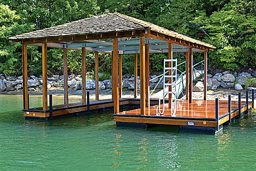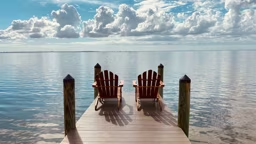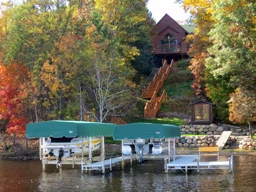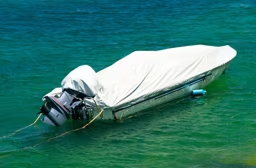Denial Party
In Minocqua, Wis., the Coliannis celebrate with wine, cheese and surround-sound jazz beneath the star-glittered sky upon the shores of Blue Lake for their annual Denial Party. They snap their fingers, like rain on a tin roof, to the poetry readings that have become family tradition – and tease one last night out of a summer spent together and among friends. “I think it probably got nicknamed after my sister, Gail,” says Joseph Colianni of the Denial Party. “We would know not to ask her about when she was going home.”
Given the choice between saying goodbye and denying it, Colianni’s sister, Gail Komarek, chooses like a scheming politician to deny everything. You might, too, if forced to bid adieu to 10 unfiltered weeks of family bonding. Gail’s husband, perhaps in an effort to ease his wife’s well-known denial, wrote a poem for last summer’s denial party. It ended with the words, “we keep wishing for a summer that never ends.”
Joseph Colianni says, “It’s not a place we think of as a vacation place.” He and his wife, Tammi, are parents to eight children. “It’s a home. We’re teaching our kids – without using words – to enjoy cousins, grandma and grandpa, aunts and uncles and to appreciate this idea of family and old friendships.”
Some of Colianni’s most lasting and rewarding friendships were formed and still flourish at the lake. “I’m 44,“ he says, “and [find myself on this boat with someone who is] this little girl that I grew up with.”
The reason for a season-ending get-together like the Coliannis’ is as simple as it is universal. It’s one last chance to tie a kite-string around summer’s tail and play together.
The gatherings are so intimate and so personal as to make one forget they’re a phenomenon likely to be found almost everywhere.
In Minocqua, Wis., the Coliannis celebrate with wine, cheese and surround-sound jazz beneath the star-glittered sky upon the shores of Blue Lake for their annual Denial Party. They snap their fingers, like rain on a tin roof, to the poetry readings that have become family tradition – and tease one last night out of a summer spent together and among friends. “I think it probably got nicknamed after my sister, Gail,” says Joseph Colianni of the Denial Party. “We would know not to ask her about when she was going home.”
Given the choice between saying goodbye and denying it, Colianni’s sister, Gail Komarek, chooses like a scheming politician to deny everything. You might, too, if forced to bid adieu to 10 unfiltered weeks of family bonding. Gail’s husband, perhaps in an effort to ease his wife’s well-known denial, wrote a poem for last summer’s denial party. It ended with the words, “we keep wishing for a summer that never ends.”
Joseph Colianni says, “It’s not a place we think of as a vacation place.” He and his wife, Tammi, are parents to eight children. “It’s a home. We’re teaching our kids – without using words – to enjoy cousins, grandma and grandpa, aunts and uncles and to appreciate this idea of family and old friendships.”
Some of Colianni’s most lasting and rewarding friendships were formed and still flourish at the lake. “I’m 44,“ he says, “and [find myself on this boat with someone who is] this little girl that I grew up with.”
The reason for a season-ending get-together like the Coliannis’ is as simple as it is universal. It’s one last chance to tie a kite-string around summer’s tail and play together.
The gatherings are so intimate and so personal as to make one forget they’re a phenomenon likely to be found almost everywhere.
Dock Parties
In parts of the United States that are gripped by winter’s beard of ice and snow, denial parties give way to a more functional farewell: the dock party.
While cabin owners may visit their places year round, shifting ice on lakes means docks must come out of the water to prevent damage. So it is on Wilson Lake in Acton, Maine. Lake friends and neighbors parade the shores as they pull in one dock after another in one massive sweep around the lake. Imagine two groups working together, one walking, the other wading. “I don’t know what you’d think it was, if you didn’t know what it was,” says Chuck Martin, one of the Wilson Lake participants, of the Labor Day ritual. “It’s just one mass of people.” Afterward, they all enjoy a cup of hot chocolate together.
Beth Wiese is a cabin owner on Lake Loveless in Polk County, Wis. For the longest time, she thought the dock party between her family and its neighbors along Reidner Lane stood alone in the annals of lake living. “We thought we started it,” she says, rifling through photographs of parties past. “What strikes me about the pictures are the smiles on everybody’s faces. But for many of us it’s a sad time, too. We’re getting ready to not see each other.”
Wiese understands the concept of denial all too well. She remembers her late husband, Jim Porter, chopping holes in the ice with an ax in an effort to retrieve the dock from its frozen clutches. “That’s the perfect example of denial,” she says. “We put it off as long as we possibly can. Everybody wants to postpone the end of summer.”
Of course, time stands still for no man (or lake lover in this case). So if it’s going to end, it might as well look like the party’s over. In the case of Lake Wilson, that means leaving the lake to its natural beauty. “By the end of the day, it looks like the lake has been stripped,” Martin says. “The lake looks so much bigger.”
A member of a tournament water-ski team, Martin and his family enjoy the water every day without fail. Not even the end of summer and absence of their dock can stop the Martins from water-skiing on Lake Wilson. They trailer their boat to the nearby boat landing so they can continue skiing until late fall.
Come spring, the Lake Wilson residents converge again. This time it’s for an annual Memorial Day weekend dock staging gathering. “It’s the reverse,” Martin says. “There’s nothing along the shore, then all of a sudden it’s the middle of summer.”
His son, an accomplished wakeboarder, broke his hand during a recent practice. Certainly, though, he’ll be ready to put in the docks come spring. “It’s something you graduate into,” Martin says. “We’ve got a lot of little kids and letting them join the crew is a rite of passage. I’ve been going there for 40 years, and I remember Labor Day when I was 12 years old going to take things out of the water for the first time.
“We didn’t have the substantial things we have today, but it was the same sense of community. Everybody helps everybody.”
There’s no denying that.
Brady Slater is a freelance writer who loves writing from home so much he denies ever spending 11 years in newspaper work.
In parts of the United States that are gripped by winter’s beard of ice and snow, denial parties give way to a more functional farewell: the dock party.
While cabin owners may visit their places year round, shifting ice on lakes means docks must come out of the water to prevent damage. So it is on Wilson Lake in Acton, Maine. Lake friends and neighbors parade the shores as they pull in one dock after another in one massive sweep around the lake. Imagine two groups working together, one walking, the other wading. “I don’t know what you’d think it was, if you didn’t know what it was,” says Chuck Martin, one of the Wilson Lake participants, of the Labor Day ritual. “It’s just one mass of people.” Afterward, they all enjoy a cup of hot chocolate together.
Beth Wiese is a cabin owner on Lake Loveless in Polk County, Wis. For the longest time, she thought the dock party between her family and its neighbors along Reidner Lane stood alone in the annals of lake living. “We thought we started it,” she says, rifling through photographs of parties past. “What strikes me about the pictures are the smiles on everybody’s faces. But for many of us it’s a sad time, too. We’re getting ready to not see each other.”
Wiese understands the concept of denial all too well. She remembers her late husband, Jim Porter, chopping holes in the ice with an ax in an effort to retrieve the dock from its frozen clutches. “That’s the perfect example of denial,” she says. “We put it off as long as we possibly can. Everybody wants to postpone the end of summer.”
Of course, time stands still for no man (or lake lover in this case). So if it’s going to end, it might as well look like the party’s over. In the case of Lake Wilson, that means leaving the lake to its natural beauty. “By the end of the day, it looks like the lake has been stripped,” Martin says. “The lake looks so much bigger.”
A member of a tournament water-ski team, Martin and his family enjoy the water every day without fail. Not even the end of summer and absence of their dock can stop the Martins from water-skiing on Lake Wilson. They trailer their boat to the nearby boat landing so they can continue skiing until late fall.
Come spring, the Lake Wilson residents converge again. This time it’s for an annual Memorial Day weekend dock staging gathering. “It’s the reverse,” Martin says. “There’s nothing along the shore, then all of a sudden it’s the middle of summer.”
His son, an accomplished wakeboarder, broke his hand during a recent practice. Certainly, though, he’ll be ready to put in the docks come spring. “It’s something you graduate into,” Martin says. “We’ve got a lot of little kids and letting them join the crew is a rite of passage. I’ve been going there for 40 years, and I remember Labor Day when I was 12 years old going to take things out of the water for the first time.
“We didn’t have the substantial things we have today, but it was the same sense of community. Everybody helps everybody.”
There’s no denying that.
Brady Slater is a freelance writer who loves writing from home so much he denies ever spending 11 years in newspaper work.
 Garret Bautista
Garret Bautista 










